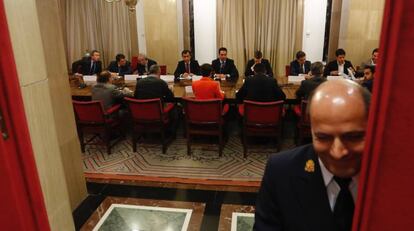Parties fail to reach agreement to cut election campaign spending
Disagreement between political groups means that another €130m will be spent on the repeat polls

Spain’s main parties have failed to reach a deal to reduce the more than €130 million that the new general election of June 26 will cost.
Irreconcilable differences between the traditional parties – the Popular Party (PP) and the Socialists (PSOE) – and the emerging groups Podemos and Ciudadanos blocked all progress at a meeting held on Wednesday morning in Congress.
Under Spanish legislation, the state puts up part of the money in the 15-day electoral campaign
All party representatives made an outward pledge to seek austerity in this new election run, yet failed to sign any document with binding decisions.
As a result, any cutbacks to campaign spending will depend on unilateral decisions by each party.
Under Spanish legislation, the state puts up part of the money in the 15-day electoral campaign, through subsidies for political mail and for every seat obtained in Congress and the Senate. At the December 20 election, political mailings alone cost the state around €30 million.
The Socialists have announced that they are ready to slash 30% off their campaign budget – up to €7 million – and the PP conservatives are willing to do the same, representing savings of €3.6 million.
These two parties had originally wanted all political groups to subscribe to the 30% reduction, but the emerging parties noted that this would still leave them at a disadvantage. Instead, they proposed a ceiling of around €12 million on the absolute spending figure. The PSOE and PP refused, although the Socialists later said they would accept either option, as it came out to a similar amount.
At the December 20 election, political mailings alone cost the state around €30 million
The Socialists further accept having the state subsidy for political mailing reduced from €0.18 to €0.15, a proposal that Ciudadanos agrees on. The PP says it is willing to go under €0.18, but did not specify by how much.
Another stumbling block was the issue of whether to send out all political mail in one envelope, or separately. The two main parties want individual mailings, while all the other parties at the table supported a common envelope in order to slash the state’s expenditure on this item.
The lack of agreement over campaign spending mirrors the fruitless efforts at building governing alliances following the inconclusive general election of December 20. On May 3, following Spanish legislation, King Felipe VI announced the dissolution of parliament and called a fresh election for June 26. Polls suggest a similarly fragmented outcome that will force parties to seek governing deals.
English version by Susana Urra.
Sign up to our newsletter
EL PAÍS English Edition has launched a weekly newsletter. Sign up today to receive a selection of our best stories in your inbox every Saturday morning. For full details about how to subscribe, click here.
Tu suscripción se está usando en otro dispositivo
¿Quieres añadir otro usuario a tu suscripción?
Si continúas leyendo en este dispositivo, no se podrá leer en el otro.
FlechaTu suscripción se está usando en otro dispositivo y solo puedes acceder a EL PAÍS desde un dispositivo a la vez.
Si quieres compartir tu cuenta, cambia tu suscripción a la modalidad Premium, así podrás añadir otro usuario. Cada uno accederá con su propia cuenta de email, lo que os permitirá personalizar vuestra experiencia en EL PAÍS.
¿Tienes una suscripción de empresa? Accede aquí para contratar más cuentas.
En el caso de no saber quién está usando tu cuenta, te recomendamos cambiar tu contraseña aquí.
Si decides continuar compartiendo tu cuenta, este mensaje se mostrará en tu dispositivo y en el de la otra persona que está usando tu cuenta de forma indefinida, afectando a tu experiencia de lectura. Puedes consultar aquí los términos y condiciones de la suscripción digital.








































